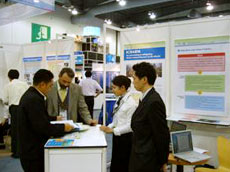News
| 4th World Water Forum Report |
| 
Centro Banamex
The 4th World Water Forum was held at the Centro Banamex
convention center in Mexico City on March 16-22, 2006. More than 10,000 people
registered to participate, and for the week, experts, researchers, and the general
public from all over the world discussed various water issues and joined awareness
promoting events. ICHARM hosted one of the exhibitions at the Japan Pavilion
and co-hosted a session with UNESCO and the World Meteorological Organization
at the Forum to promote the public awareness of the newly-born institute.
For an overview of the 4th World Water Forum, visit the Japan Water Forum at http://www.waterforum.jp/. |
[ICHARM exhibition booth] ICHARM ran
self-promoting activities at the Japan Pavilion, part of the World Water Expo
where companies and research institutes worldwide set their own booths to present
their activities. At our booth, we exhibited panels outlining the policies and
activities of ICHARM. We had a great turnout and quite a few people eagerly asked
for information about ICHARM. We prepared 500 pamphlets for visitors but were
gone in no time, and we ended up handing out photo copies of the pamphlet for
the rest of the week. Thanks to Ms. Fumie Hiroike, a volunteer Spanish translator
who is currently a college student in Mexico, we were able to promote ICHARM a
great deal although approximately half the visitors were Mexican people.
|
| 
ICHARM exhibition booth
| 
ICHARM staff answering questions
|
[Presentation in the "Integrated Flood Management" session]
Japan co-convened a session entitled "Adopting Integrated Flood Management
within the Integrated Water Resources Management" with France and the Netherlands
(See the program below for the date, participants and their titles). The integrated
flood management aims to promote an approach that is cross-sectional and integrated
to minimize negative impact caused by floods while maximizing positive impact
by floods, including effective use of flood plains. The session began with
opening addresses by Mr. Seiji and Mr. Bertaud on behalf of the co-convening countries.
After that, case studies from four countries (India, France, Japan, the Netherlands)
were presented. A panel discussion, moderated by Mr. Tyagi, followed based on
the presentations. Mr. Terakawa made a presentation entitled "Integrated
Flood Management for Urbanized River Basins in Japan," explaining lessons
that Japan learned from experience as follows: - It is important to take
preventive measures in advance;
- Participation of stakeholders in planning
is likely to result in reduction in cost and time for decision making;
-
It is important to try to minimize disaster damage even if it is beyond the design
level;
- It is important to predict and take preservation measures against
impact on the hydrologic environment due to change in watershed land use. He
also pointed out, in the panel discussion, the necessity for the introduction
of an approach integrating structural measures (dams, levees, flood control basins,
etc.) and non-structural measures (flood forecasting and warning, flood hazard
maps, risk-based land utilization guide) based on local needs. "Adopting
Integrated Flood Management
within the Integrated Water Resources Management" March
18 11:15-13:15, in Room Diezmo2, Centro Banamex |
PROGRAMOpening remarks from convener
Mr. Masato Seiji
: Vice-Minister for Engineering Affairs, MLIT, Japan
Mr. Pascal Bertaud
: Water Director, MEDD, France Presentation of local actions
Community
Approach to Flood Management
Prof Kamta Prasad
(Institute for Resource
Management and Economic Development, India)
Plan Loire Grandeur Nature
Mr. Regis Thepot (Etablissement Public Loire, France)
Tama and Tsurumi River
Basin Water Master Plan
Mr. Akira Terakawa (Public Works Research Institute,
Japan)
River widening project: Overdiepse Polder
Mr. Ben van den Reek
(Province of North Brabant, the Netherlands) Panel discussion
Moderator:
Mr. Avinash Tyagi (Director, Hydrology and Water Resources Department, WMO) Wrap-up
and conclusion |
[A session on the International Flood Initiative (IFI)]
Mr. Matsuura making an opening address (From left: Prof.
Takeuchi, Mr.
Tyagi, Mr. Matsuura, Prof. Ginkel, Dr. Szollosi-Nagy) ICHARM
co-convened a session entitled "Collaborative Approach among International
Agencies for Effective Flood Risk Management - International Flood Initiative
(IFI)" with UNESCO and the World Meteorological Organization (WMO) (See the
program below for the date, participants and their titles). After opening addresses
by Mr. Matsuura, Mr. Jarraud on behalf of Mr. Tyagi, and Mr. Ginkel, Mr. Takeuchi
of ICHARM reported on the official launch of ICHARM and explained its policies
and activities. Collaborative Approach among International Agencies
for Effective Flood Risk Management
- International Flood Initiative (IFI)
Co-organized by PWRI, UNESCO, WMO
Place: Montejo 3 Date: 21 March
2006 Time: 16:45-18:45 PROGRAM Moderator: Dr. Andras Szollosi-Nagy
(UNESCO) Opening Address
Mr. K. Matsuura, Director
General, UNESCO
Mr. M. Jarraud, Secretary General, WMO
Prof. H. van
Ginkel USG, Rector UNU
Prof. K. Takeuchi, Director of ICHARM, PWRI
Implementation of Hyogo Framework for Actions in the Area of Water-related disasters
Dr. S. Briceno (ISDR)
Importance of Multi-disciplinary Approaches in Integrated
Flood Management
Mr. A. Tyagi (WMO)
Concept of the International Flood
Initiative
Dr. K. N. N. Thein (UNESCO-IHP)
Tools for Consensus Building
for Comprehensive Flood Loss Prevention Measures
Mr. K. Miyake (MLIT)
Human Security and Flood Risks
Prof. J. Bogardi (UNU)
Research Needs
in Disaster Response Systems
Dr. A. Askew (IAHS)
Environmental and
Ecological Aspects of Integrated Flood Management
Prof. N. Tamai (IAHR)
Capacity Building of Flood Hazard Mapping
Mr. S. Tanaka (ICHARM) Open
Discussions & Wrap Up | |

